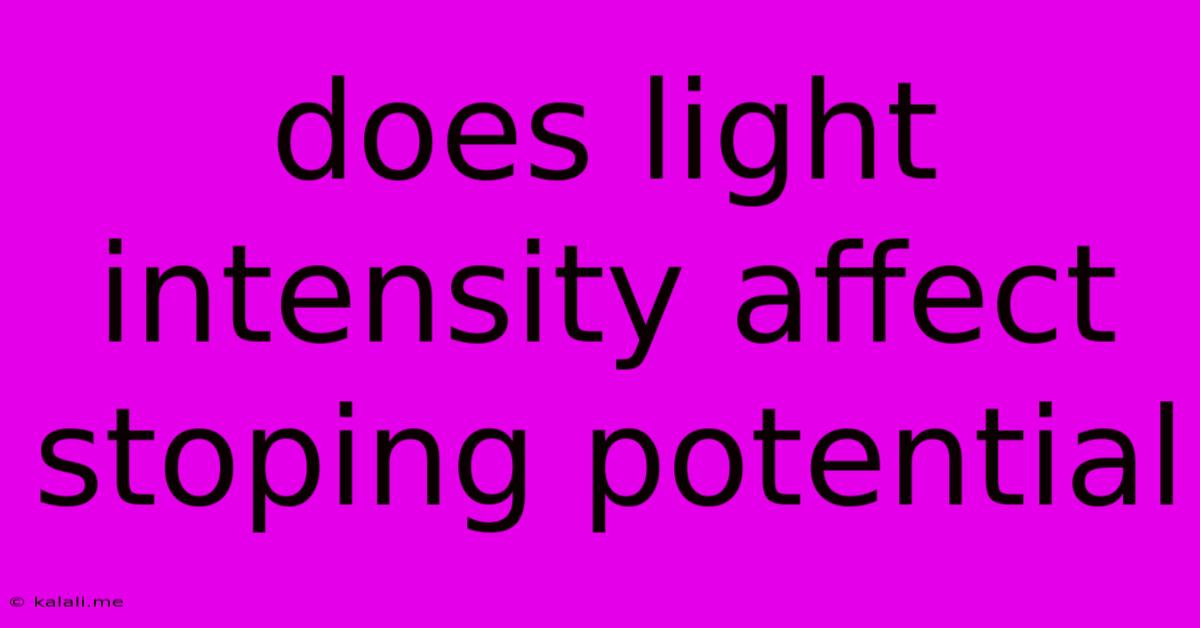Does Light Intensity Affect Stoping Potential
Kalali
Jun 06, 2025 · 3 min read

Table of Contents
Does Light Intensity Affect Stopping Potential? Unraveling the Photoelectric Effect
The photoelectric effect, the emission of electrons when light hits a material, is a fascinating phenomenon that reveals fundamental aspects of quantum mechanics. A key concept related to this effect is stopping potential, the minimum potential difference required to stop the most energetic emitted electrons from reaching the anode. But does the intensity of the light source influence this stopping potential? This article delves into the relationship between light intensity and stopping potential, clarifying some common misconceptions.
Understanding the Basics: Light Intensity and the Photoelectric Effect
The photoelectric effect demonstrates that light behaves as a stream of discrete energy packets called photons. The energy of each photon is directly proportional to the frequency (or inversely proportional to the wavelength) of the light, as described by Einstein's famous equation: E = hf, where 'h' is Planck's constant and 'f' is the frequency. Light intensity, on the other hand, refers to the number of photons striking the surface per unit area per unit time. A more intense light means more photons impacting the material.
The Role of Stopping Potential
When light shines on a metal surface, electrons are emitted if the photon energy (hf) is greater than the work function (Φ) of the metal – the minimum energy required to free an electron from the material. The kinetic energy (KE) of the emitted electrons is given by: KE = hf - Φ. The stopping potential (Vs) is the voltage needed to completely halt these electrons. It's directly related to the maximum kinetic energy of the emitted electrons: KEmax = eV<sub>s</sub>, where 'e' is the charge of an electron.
Does Intensity Affect Stopping Potential? The Answer is No!
The crucial point is that increasing the intensity of the light does not increase the energy of individual photons. It only increases the number of photons. While a higher intensity light will result in more electrons being emitted (increasing the photoelectric current), the maximum kinetic energy of each emitted electron remains unchanged. This means the stopping potential, which depends solely on the maximum kinetic energy, also remains unaffected by changes in light intensity.
Why the Misconception Exists
The relationship between intensity and current in the photoelectric effect might lead to confusion. A more intense light source indeed produces a larger photocurrent (more electrons emitted per second). This increase in current might be misinterpreted as an increase in the energy of the emitted electrons, thus impacting the stopping potential. However, this is incorrect. The maximum kinetic energy of each electron, and therefore the stopping potential, is solely determined by the frequency (or wavelength) of the incident light.
Experimental Verification and Implications
Numerous experiments have consistently demonstrated that changing the intensity of the incident light, while keeping its frequency constant, does not affect the stopping potential. This experimental observation strongly supports the quantum nature of light and the particle-like behavior of photons, confirming Einstein's explanation of the photoelectric effect.
In Summary
The stopping potential in the photoelectric effect is solely determined by the frequency (or energy) of the incident light and the work function of the material. Light intensity, while affecting the number of emitted electrons and hence the photocurrent, has no influence on the stopping potential. Understanding this distinction is key to grasping the fundamental principles of the photoelectric effect and the quantum nature of light.
Latest Posts
Latest Posts
-
How To Play Starcraft 2 Offline Single Player Pc
Jun 07, 2025
-
Factors Of That Add Up To
Jun 07, 2025
-
Burnt Milk On Glass Stove Top
Jun 07, 2025
-
Word For When You Spot Something Wrong
Jun 07, 2025
-
How To Clean 3d Printer Bed
Jun 07, 2025
Related Post
Thank you for visiting our website which covers about Does Light Intensity Affect Stoping Potential . We hope the information provided has been useful to you. Feel free to contact us if you have any questions or need further assistance. See you next time and don't miss to bookmark.